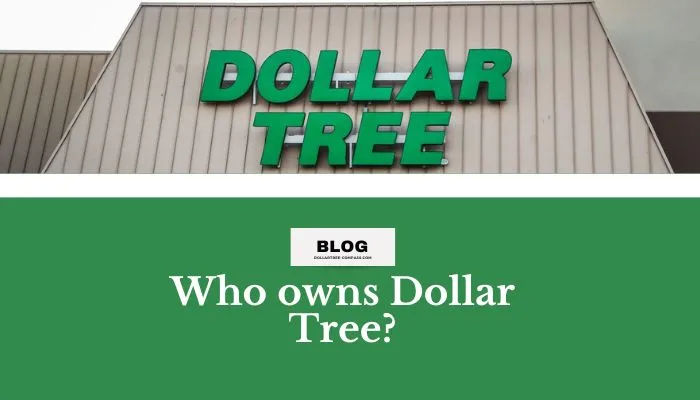Now a retail behemoth, Dollar Tree is known for its deep discounts on daily necessities. However, have you ever pondered who runs this bargain haven?
A corporation like Dollar Tree’s ownership structure provides insight into its history, present, and future. So fasten your seatbelts and join us as we explore the corporate structure, history, and major stakeholders of Dollar Tree.

Why Does Ownership Matter?
Let’s tackle the big issue before delving into Dollar Tree’s intricacies: why is ownership even important? Within a firm, decision-making is determined by ownership. Major shareholders, or those who own a significant percentage of the company’s equity, are able to influence important decisions on mergers and acquisitions, top management appointments, and strategic direction. Understanding the ownership structure helps us better understand the variables behind Dollar Tree’s growth.
A Review of Dollar Tree’s Extensive Past
The Dollar Tree narrative starts in 1959 with Leon Levine, a young businessman. Inspired by the notion that all individuals ought to have access to high-quality goods at reasonable costs, Levine established the first Family Dollar location in Charlotte, North Carolina. This was the beginning of a retail strategy that will transform the cheap shopping scene for all time.
Dollar Tree has grown astronomically throughout the years. The following significant turning points highlight this amazing journey:
- 1968 saw the opening of $1 Tree, a shop that sold everything for one $1.
- 1990s: The business starts a massive shop network throughout the US as part of an ambitious growth plan.
- 2015: Family Dollar, Dollar Tree’s largest rival, is acquired by Dollar Tree, becoming a formidable retail force.
- 2021: In response to growing expenses, Dollar Tree breaks over the $1 pricing barrier and sets a new $1.50 price threshold for certain products.
Examining the Corporate Structure of Dollar Tree: A Closer Look
The parent corporation in charge of a large network of shops is Dollar Tree, Inc. It’s crucial to recognize the differences between the parent company and its subsidiaries, however. This is an explanation:
- Dollar Tree, Inc.: This is the main person, the boss, who makes all of the decisions. It is in charge of the company’s overall strategy, financial results, and corporate governance.
- Affiliates: Family Dollar shops and Dollar Tree stores are the two main brands under which Dollar Tree operates. These subsidiaries operate independently within the broader corporate structure.
Who’s in Charge of the Purse? An Examination of Dollar Tree’s Principal Owners
Although the world of significant stockholders might be complicated, knowledge of it offers important perspective. What you should know is as follows:
- Investors with Institutions: These are the organizations that own a significant portion of Dollar Tree’s shares, including pension funds, mutual funds, and investment companies. Their choices have a big influence on the company’s path.
- Insider ownership is the term used to describe the ownership share that members of the company’s executive and board ranks have. Their ownership may have an impact on strategic choices and shows their belief in the company’s future.
The Enigma of Public Perception
The typical Dollar Tree customer may not give the ownership of the business much thought. Public opinion does, however, matter. How to do it is as follows:
- Views from Customers: It’s probable that a lot of customers think Dollar Tree is a family-run company that specializes in offering necessities at deeply discounted costs. The company’s focus on value and its extensive selection of home items may contribute to this view.
- Media Attention: Public perception may also be shaped by media depictions. Informal consumers may not be interested in news stories about Dollar Tree’s ownership structure if they concentrate on recent acquisitions or institutional investors.
- Impact on Conduct: It’s interesting to note that behavior may change if consumers are aware of ownership structure. Certain customers may be more inclined to purchase from a business if it is well-known for its moral business methods and dedication to fair work, for example.
Beyond the Bargain Bin: Issues & Disagreements
It’s not always easy being an owner. Like many businesses, Dollar Tree has had several ownership-related difficulties:
- Previous Debates: Disagreements among significant shareholders have sometimes reached the public spotlight, casting doubt on the company’s future and course.
- Legal Battles: Ownership conflicts may sometimes result in litigation, which can further complicate business operations and perhaps lower staff morale.
- Regulatory Scrutiny: Regulatory organizations that make sure Dollar Tree complies with different laws and ethical standards may scrutinize the company more closely depending on its ownership structure.
Taking the Wheel: The Effects of Ownership on Business
The ownership structure of Dollar Tree has a direct impact on its operations:
- Making Decisions: Major shareholders’ interests may have a significant impact on decision-making. For example, long-term expenditures in staff training or product quality may be compromised if short-term earnings are prioritized.
- Changes in Strategy and Policy: Significant changes in a company’s policies and strategy might result from ownership changes. A fresh cohort of influential stockholders may provide precedence to e-commerce transactions or expand the assortment of more costly merchandise.
- Extended Durability: The long-term viability of a corporation may also be impacted by its ownership structure. Sustainable methods and ethical sourcing are more likely to be given priority by ownership that is committed to long-term wealth generation.
Crystal Ball Gazing: The Prospects for Ownership of Dollar Tree
The ownership landscape is ever-changing, and Dollar Tree is no different:
- Recent Shifts: Dollar Tree’s ownership structure may have undergone recent changes as a result of alterations to the board of directors’ makeup or variations in the holdings of significant shareholders.
- Upcoming Events: Although it is hard to forecast the future with absolute precision, probable developments may include changes in shareholder goals, mergers and acquisitions, or even a move toward a more employee-owned business structure.
- The Effect of Ownership on Trajectories: Forecasting the future course of Dollar Tree will need an understanding of the potential evolution of ownership. Will it continue to be a cheap refuge or will it change to accommodate shifting customer demands and competitive pressures?
The Total: The Significance of Ownership
Gaining insight into Dollar Tree’s ownership structure allows us to better understand the factors that have produced this massive retail company. Each component of the puzzle—from the founder’s vision to the sway of significant investors—contributes to the distinctive tale of Dollar Tree.
Understanding the company’s ownership will be essential to projecting its future direction and evaluating its influence on the bargain shopping industry as it navigates a constantly shifting retail marketplace.
We are better able to understand the factors that have shaped this massive retail chain by exploring the intricacies around Dollar Tree’s ownership. Ownership is a crucial component that affects everything from customer perception to possible future advancements.
In the end, knowing who controls the purse strings empowers us to make better judgments about where we purchase and the potential effects these choices may have on businesses and their workers. The ownership narrative of Dollar Tree will be an intriguing one to follow as it makes its way through the always shifting retail world.

Hi, I’m Donette Howington, your committed Customer Support Specialist for the DollarTree-Compass platform. Currently serving as an Assistant Store Manager at Dollar Tree, my 3+ years of experience ensure I can assist and guide you, ensuring a seamless experience.
Contents
- Why Does Ownership Matter?
- A Review of Dollar Tree’s Extensive Past
- Examining the Corporate Structure of Dollar Tree: A Closer Look
- Who’s in Charge of the Purse? An Examination of Dollar Tree’s Principal Owners
- The Enigma of Public Perception
- Beyond the Bargain Bin: Issues & Disagreements
- Taking the Wheel: The Effects of Ownership on Business
- Crystal Ball Gazing: The Prospects for Ownership of Dollar Tree
- The Total: The Significance of Ownership